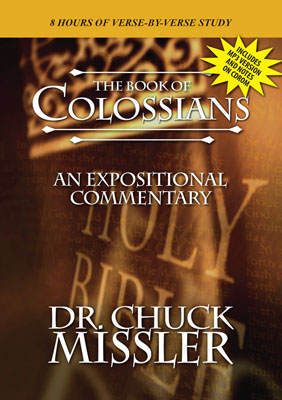Paul’s Epistle to the Colossians has several unique and compelling characteristics. It is regarded as including the most elevated view of Christ to be found in the Bible, and it also focuses on the most relevant insights and counsel for Believers in our present day.
The Occasion
The Book of Colossians was written by the Apostle Paul about A.D. 60-62, while he was imprisoned in Rome. One purpose was to correct the heresy that had sprung up in the Asian city of Colossae.
Colossae was one of three cities in the Lycus Valley, about 100 miles east of Ephesus (capital) in Asia Minor. Its name is possibly derived from Colossus, a large statue. Colossae is about 12 miles from Hierapolis and Laodicea, the other two cities of the valley.1 The area was a meeting point of East and West—an important trade route passed through there—so it was fertile ground for religious speculations and heresies.
Several references in Colossians indicate that Paul had not visited the city.2 The church there was an outgrowth of the three years Paul spent in Ephesus.3 So effective was the witness of the church at Ephesus that “all they which dwelt in Asia heard the word of the Lord Jesus...”4
Two men, Epaphras and Philemon,5 who were in Ephesus, seem to have been primarily responsible as founders.6 Epaphras apparently carried the thrilling news of the Gospel to his family back home in Colossae.7 Philemon had a church meeting in his home.8 It is likely that Apphia and Archippus were respectively the wife and son of Philemon, and Archippus was the pastor of the church.9
The Colossian church seems to have been predominantly Gentile10 and about five years old when Paul wrote this letter. While in prison, Paul met a runaway slave named Onesimus who belonged to Philemon. Paul led him to Christ, and then wrote Philemon, asking his friend to forgive Onesimus and receive him back as a brother in Christ.
At the same time, Epaphras showed up in Rome because he needed Paul’s help. In his status report, some new doctrines were being taught in Colossae and were invading the church and creating problems.
The Epistle itself gives it as being due to the arrival of Epaphras from Colossae.11 Since Paul’s departure for Rome, the “grievous wolves” whom he foresaw in Miletus12 had descended upon these churches and were playing havoc with many and leading them astray, much as new cults today mislead the unwary.
Epaphras remained with Paul in Rome.13 Onesimus and Tychicus carried Paul’s epistles to their destinations: Ephesus,14 Colossians15 and Philemon. Epaphras was called Paul’s “fellow-prisoner,” a title also given to Aristarchus.16 It has been suggested that Epaphras willingly remained with Paul to assist him. They were Paul’s willing companions, sacrificing their own comfort to assist and comfort him.
The circumstance which prompted the writing of Colossians seemed to be the special heresies that arose there. This false teaching seemed to be the beginning of what later (in the second century) developed into Gnosticism (from gnosis, “to know”). They declared themselves “in the know” when it came to the deep things of God; they felt they were the “spiritual aristocracy” in the church, with a pretension to knowledge. These pretensions were similar to the Theosophists of today, and the so-called New Agers. Colossians seems written expressly for our own day when so many are trying to rob Jesus Christ of his deity.
[Huxley coined the term agnostic, which means “without knowledge”; in Latin the word is translated, ignoramus!]
These errors are important to understand since these attacks on the deity of Christ are just as prevalent today as then. Each cult group involves a strategy to misrepresent some aspect of revealed truth in regards to Christ and His redemptive work.
These views undermined the very foundations of the Christian faith, and attacked the person and work of Jesus Christ. To them, He was but one of God’s many “emanations” and not the very Son of God, come in the flesh. The Incarnation means “God with us,”17 but these false teachers claimed that God was keeping His distance from us! When we trust the Son of God, there is no need for any intermediary beings between us and heaven!
In His work on the cross, Jesus Christ settled the sin question18 and completely defeated all Satanic forces.19 He put an end to the legal demands of the law.20 He alone is the Preeminent One and completely sufficient.21
Gnosticism contained several characteristics:
- It was Jewish, stressing the need for observing Old Testament laws and ceremonies;
- It was philosophical, laying emphasis on some special or deeper knowledge (gnosis);
- It involved the worship of angels as mediators to God;
- It was exclusive, stressing the special privilege and “perfection” of those select few who belonged to this philosophical elite.
The gnostics came to the false conclusion that matter was evil; that a powerful spirit world used material things to attack mankind. They held to a form of astrology, believing that angelic beings associated with heavenly bodies influenced affairs on earth.22 Added to these Eastern speculations was a form of Jewish legalism: the idea that the rite of circumcision was helpful in spiritual development and the Old Testament dietary laws were also helpful in attaining spiritual perfection. Good and evil were derived from rules and regulations.
Here was “something for everybody”—an attempt to harmonize and unite many different schools of thought into a composite religion. These teachers claimed that they were not denying the Christian faith, but only lifting it to a “higher level.” Do we have any of these heresies today? Indeed, and they are ever more dangerous!
Nothing “New” in the “New Age”
Cults misrepresent revealed truth with regard to Christ’s deity and His redemptive work. If we strive for “spiritual perfection” or “fullness” by means of formulas, disciplines, or rituals, our progress is reversed.
We must beware of teachers who offer victory and fullness yet bypass simple devotion to Jesus Christ. Those familiar with the Colossian teaching will not be misled by occult deception, like New Age, or other mysticism now being foisted upon the naïve.
Every modern erroneous cult is some ancient Satanic heresy revived. Every “new” heresy has been anticipated by the Holy Spirit. Satan has nothing new to offer. We live in a day when religious toleration is interpreted to mean “one religion is as good as another.”
Many people try to take the best from various religions and fabricate their own. To them Christ is only one of several great religious teachers, with no more authority than they have. He may be prominent, but certainly not preeminent.
When we make Jesus Christ and the Bible only a part of a total religious system or philosophy, we cease to give Him preeminence. When we strive for “spiritual perfection” or “fullness” by means of formulas, disciplines, or rituals, we go backward rather than forward.
We must beware of mixing our Christian faith with such alluring things as yoga, transcendental meditation, Oriental mysticism, and the like. We must also beware of the “deeper life” teachers who offer a system for victory and fullness that bypasses devotion to Jesus Christ. In all things, He must have preeminence!
Christ Preeminent
In Colossians, Christ’s preeminence is the main theme. Paul talks about the fullness of Christ and the sufficiency of Christ. Christ is the visible form of the invisible God, the prior head of all creation. In Him the universe was created. He is before the universe; in Him the universe coheres. He is the head of the body, the church, and the firstborn from among the dead. He’s above all of the angels, including Satan. His preeminence is declared:
For by Him were all things created, that are in heaven, and that are in earth, visible and invisible, whether they be thrones, or dominions, or principalities, or powers: all things were created by Him, and for Him: And He is before all things, and by Him are all things held together. And He is the head of the body, the church: who is the beginning, the firstborn from the dead; that in all things He might have the preeminence. For it pleased the Father that in Him should all fullness dwell.
Colossians 1:16-19
Many Bible scholars have concluded that Colossians is the most profound letter Paul ever wrote. Our study on the Epistle to the Colossians has been updated recently and is now available on DVD, MP3 CD-ROM and download.
Notes:
Colossians 4:13, 16
Colossians 1:7; 2:1; 4:12.
Acts 19; 20:17-38.
Acts 19:10.
Philemon 19.
Colossians 1:7.
Cf. Mark 5:19.
Philemon 2.
Colossians 4:17.
Colossians 1:25-29; 3:5-9.
Colossians 1:7-9; 4:12f.
Acts 20:29f.
Colossians 4:12-13.
Ephesians 6:21.
Colossians 4:7-9.
Colossians 4:10; Philemon 23.
Matthew 1:23.
Colossians 1:20.
Colossians 2:15.
Colossians 2:14-17.
Colossians 1:18; 3:11.
Colossians 1:16; 2:10, 15.







